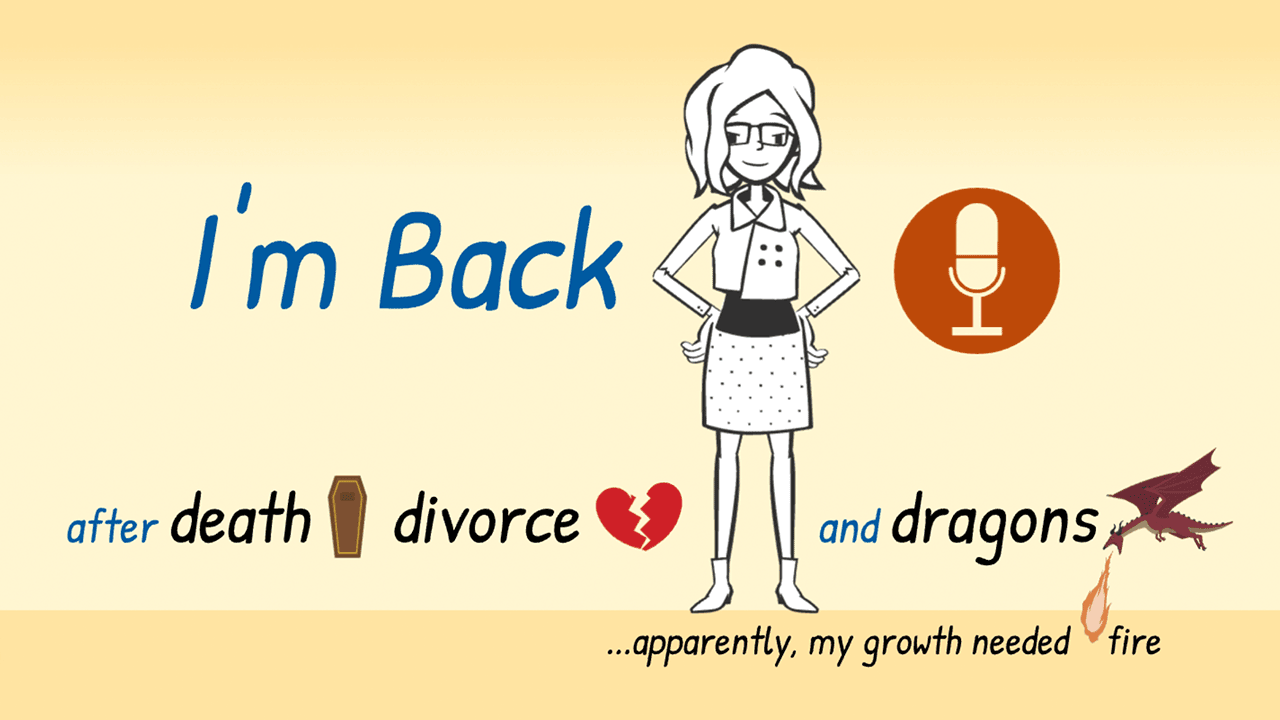Book Brief: Big Magic by Elizabeth Gilbert
Jan 25, 2023
🎧 👉 Prefer audio? You can also listen to me share about this in podcast episode #039 here.
Today I want to share with you a book I recently listened to called Big Magic: Creative Living Beyond Fear. The book was written by best-selling author Elizabeth Gilbert (who you may know as the author of Eat Pray Love). I listened to the Audible book, and Liz narrated it. She has a really warm, lovely voice, and I really enjoyed listening to her. The way she spoke and arranged her words felt like I was listening to an inspiring, wise, candid, and down-to-earth girlfriend.
Here’s the official book summary:
“Readers of all ages and walks of life have drawn inspiration and empowerment from Liz Gilbert’s books for years. Now this beloved author digs deep into her own generative process to share her wisdom and unique perspective about creativity. With profound empathy and radiant generosity, she offers potent insights into the mysterious nature of inspiration. She asks us to embrace our curiosity and let go of needless suffering. She shows us how to tackle what we most love and how to face down what we most fear. She discusses the attitudes, approaches, and habits we need in order to live our most creative lives. Balancing between soulful spirituality and cheerful pragmatism, Gilbert encourages us to uncover the “strange jewels” that are hidden within each of us. Whether we are looking to write a book, make art, find new ways to address challenges in our work, embark on a dream long deferred, or simply infuse our everyday lives with more mindfulness and passion, Big Magic cracks open a world of wonder and joy.”
Here are some of my favorite takeaways...
Liz shared a story about a friend of hers who had quit the hobby of ice skating in her childhood because she knew she wasn’t going to do it professionally. She eventually took up the hobby again as an adult and found so much joy in it. But our culture does tend to have us leave the joyful activities of childhood when we transition into adulthood. It takes a concerted effort to either keep those things in our lives or, more commonly, find a way to bring them back into our lives later in life when we finally face the fact that we miss them and decide this life’s too short not to experience that joy again.
One of the funniest things in the book...
This was especially funny to me since my coaching certification is through Fearless Living. Liz says:
“...your fear is like a mall cop who thinks he’s a Navy seal. He hasn't slept in days, he's all hopped up on Red Bull, and he's liable to shoot at his own shadow in an absurd effort to keep everyone safe.”
And then, she goes on to share the welcoming speech she has for fear when she’s embarking on anything new because she knows it will show up. And she’s absolutely right. Fear will show up anytime we step into anything new.
She shared a story about Brené Brown, who told Liz that when Brené wrote her books, it was a very challenging process that she slogged through and didn’t enjoy—she felt like a martyr. Liz told her to access her “trickster” instead of her “martyr” so that she could write a book through a more joyful process. What Brené ended up doing for her next book was that she went to a beach house with girlfriends, and she engaged them in conversations about what she wanted to write about and then would go into another room to transcribe and organize the conversation into a section for the book. This process made the writing of that book very enjoyable for her, even though the content was very serious. I absolutely love the idea of accessing our inner trickster to outsmart other parts of us.
In another chapter, Liz spoke about not treating your creations like they’re your babies because then you can’t be lighthearted with them and be ok with what happens with them. She shared an example of a short story she wrote that she felt was the best thing she’s ever written, but the publication that was going to publish it needed her to cut it down by 30% in order to fit a high-profile ad in. She thought that the story at 10 pages was already the tightest it could possibly be, and she didn’t feel like there were any unnecessary words so shortening it to 7 pages initially seemed impossible. But she ended up agreeing to chop it up because she wanted it to get published. She was pleasantly surprised at how the process went because not only was she able to get it down to a bare-bones—which she didn’t even know was possible—she also was able to rework it so that it would be powerful in the shorter variation. I pictured her as a chef in a kitchen being challenged to only use a portion of the ingredients from their prized recipe, and the chef being able to remaster a new dish that may have seemed similar to the original, yet ultimately took on a life of its own and became a savory dish.
This actually ties into something else I loved in the book—Liz talks about how she thinks curiosity is more important than passion. I see this connection with the prior story in that if she didn’t let herself tap into curiosity to see if she could cut and rework that story, if she had let her passion rule her, then she would have missed the opportunity to create a new version that ended up surprising her, plus she would have missed the opportunity to be able to share it with others. In my own experience, passion for something can make you clingy and easily tempted into having expectations. I’m not saying passion is bad, but being able to be curious on a regular basis—daily—even multiple times per day—really is something that will help you navigate life with more ease.
Liz practices having a response of “That’s interesting” when things happen that seem awful because the drama is lessened with the concept of “interesting.” I’m putting that in my bag of tricks for how to avoid black-and-white thinking. “Interesting” doesn’t let you jump into black-and-white thinking; it leaves room for all kinds of gray, and it’s in the gray where we can find more peace of mind and also find the gifts and opportunities in even the shittiest of situations.
And when it comes to the concept of failure, I loved the image she created when she spoke about chopping up failure and using it as bait to catch another project. People often talk about learning from failure, but this is the first time I've ever heard anything around a visual of using it to bait as if it was on a fishing rod. I love visuals like that because they are something I can really grab a hold of, and I find that more effective to switch my attitude than just trying to practice the general concept of learning from your failures.
Overall, throughout the book, she talks about being creative and curious and trusting yourself, which are things I’ve really been accessing more for myself as well as helping my clients with.
And I know from what I’ve learned about the brain in other reading I’ve done over the past few years that it’s when you get curious and creative that you really can tap into the right side of your brain. Our bodies function in such a way that we tend to have a left-brain bias—which makes sense because our fear center is there, and it’s pretty important to have that turned on so that we can stay alive. It’s been proven, though, that if we can access the right side more and then use our whole brain instead of being left-brain dominant, things can feel easier and lighter, and life is more enjoyable.
I only touched on a handful of the wonderful gems in this book. You must get the book for yourself in order to experience it for yourself. There's so much more to it than what I touched on here!
“I believe this is one of the oldest and most generous tricks the Universe plays on us human beings, both for its own amusement and for ours; the Universe buries strange jewels deep within us all and then stands back to see if we can ever find them. The hunt to uncover those jewels—that's creative living. The courage to go on that hunt in the first place—that's what separates a mundane existence from a more enchanted one. The awesome surprising results of that hunt—that’s what I call Big Magic.”
– Liz Gilbert, Big Magic
🎧 👉 Prefer audio? You can also listen to me share about this in podcast episode #039 here.





